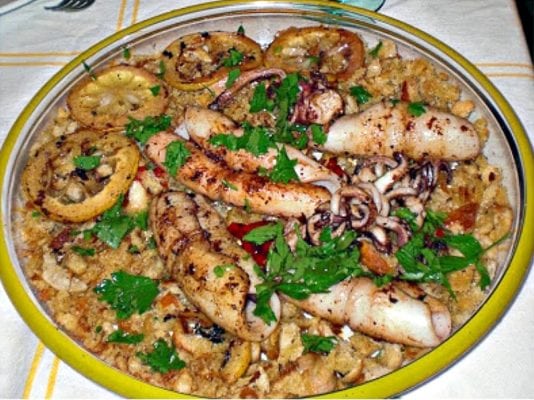A pangritatta é não mais do que pão ralado frito, e é um crime não ser mais conhecido em Portugal. É conhecido na Itália por Parmesão dos pobres, e garanto-vos que é muito bom. Melhore dizendo, este prato rústico e cheio de sabor, inspirado na tradição italiana da ‘cucina povera’, transforma ingredientes simples numa refeição surpreendente. A pangritatta, ou ‘pão ralado de pobre’, adiciona uma textura crocante e deliciosa que contrasta na perfeição com a ternura das lulas. É uma receita rápida, ideal para um jantar de semana, mas com um toque de sofisticação que também impressiona.
Ingredientes
- Pão do dia anterior
- Alho
- Malaguetas
- Tomilho Fresco (de preferência)
- Esparguete
- Lulas
- Limão
- Sal e Pimenta
- Salsa
Preparação
- Com pão do dia anterior (já rijo), pica-se num picador com o tomilho. Põe-se uma frigideira ao lume com o alho, azeite e malaguetas frescas q.b. e frita-se o pão ralado até ficar bem estaladiço.
- Enquanto coze o esparguete, vamos tratar das lulinhas.
- Bem temperadas com sal , vão a azeite quente com as rodelas de limão. É preciso ter cuidado para não fritar demasiado as lulas que ficam duras, e normalmente o limão fica frito mais rápido que as lulas.
- Depois junta-se o esparguete à pangritatta, e a salsa às lulinhas e limão, e rega-se tudo com o sumo de um limão (se gostarem). Acompanhar com um bom e frutado vinho branco maduro bem fresco!
From the shores of the Mediterranean to your table, here is the English version of this recipe.
Baby Squid with Pangrattato
This dish is a fantastic example of how simple, rustic ingredients can create something truly special. It takes inspiration from the Italian concept of “cucina povera,” or ‘poor kitchen,’ where nothing is wasted. The star of the show here is the “pangrattato” (spelled pangritatta in the original), which is essentially crispy, flavoured breadcrumbs. Often called the “poor man’s Parmesan,” it adds incredible texture and flavour to pasta dishes.
The success of this recipe lies in the beautiful contrast between the garlicky, herby crunch of the pangrattato and the tender, delicate baby squid. The key is to cook the squid very quickly over a high heat; any longer and it risks becoming tough. Cooking lemon slices alongside the squid infuses the oil and adds a wonderful, slightly caramelised citrus note to the final dish.
This is a perfect, speedy supper that feels effortlessly elegant. Serve it immediately to enjoy the textures at their best, accompanied by a glass of crisp, fruity white wine as suggested. For an extra layer of flavour, you can add a pinch of fennel seeds or some anchovies to the oil when making the pangrattato.
Ingredients
- Day-old bread
- Garlic
- Fresh chillies
- Fresh thyme (preferred)
- Spaghetti
- Baby squid
- Lemon
- Salt and pepper
- Parsley
Method
- For the pangrattato, blitz some firm, day-old bread in a food processor with fresh thyme leaves. Heat a little olive oil in a frying pan and add some sliced garlic and fresh chillies to taste. Fry the breadcrumbs in the infused oil until they are golden and very crispy. Set aside.
- While you cook the spaghetti according to packet instructions, prepare the squid.
- Season the squid generously with salt. Heat some olive oil in another pan and fry the squid with a few slices of lemon over a high heat. Be careful not to overcook the squid, as it will become tough. The lemon slices will brown faster than the squid, which is fine.
- Once cooked, toss the spaghetti with the pangrattato. Add freshly chopped parsley to the squid and lemon mixture. Serve the spaghetti topped with the squid, and squeeze over the juice of a lemon if you like. This dish is best enjoyed immediately, with a glass of good, fruity, and well-chilled white wine!

Novembro 25, 2024 @ 5:38 pm
pangritatta é tipo a farofa do mar, né? só que mais chique!
Novembro 27, 2024 @ 5:37 pm
Eu diria mais farinha de rosca com temperos e especiarias! Ou aqui em Portugal de pão ralado com alho, ervas e por vezes queijo ralado!